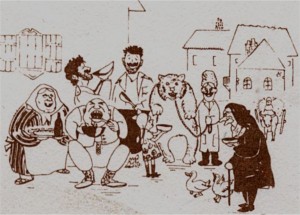October 14, 2010
The war had lasted for years and years, and famine was in the land. Two soldiers, weary of war, decided to desert from the army and seek their way back home, hoping to arrive in time for the spring planting.
They entered the village, and I don’t remember exactly what kind of village it was, but I think it was one of those where Russians and Greeks and Jews and Armenians and Ukranians and Slavs all lived and mingled together. The soldiers were nearly starving. They went from door to door, begging for food, but the villagers only peeped out, scowling.
What was to be done? The first soldier had an idea. He took three round stones, went to the village well, and washed them. There was a large iron pot in the village square, a memento of better days; he carried water form the well and filled it half-way up. His companion gathered wood, and they built a roaring fire beneath the pot.
By now the children of the village were staring at them from the fringes of the village square, and the villagers were looking out their windows wondering what was going on. As the water came to a boil, the soldiers rang the village bell and all the people poured out into the square.
The first soldier described the hunger of the soldiers and the poverty of the villagers, and announced that he was going to make stone soup to feed them all. He took his three stones and carefully placed them in the pot. The people looked at one another, wondering what sort of lunatic had been sent into their midst.
The water boiled and boiled all afternoon as the soldiers told tales of the lands they had seen. The village animals slinked or pranced about. The village musicians came out in the square to play.
Finally the first soldier announced that it was time to taste the soup. He took a big bowlful, blew on it, and sipped. “It is a good soup. But it needs something. Here, you taste this and tell me what it needs.” The soldier looked hard and the nearest villager who quickly tasted and said, somewhat apprehensively, “I think it needs an onion.” “An onion!” said the soldier. “Anyone knows you can’t make soup without an onion.”
Now one of the children, who knew where an onion was hidden, went and got it and handed it to the soldier. He peeled it and threw it in the soup.
 Another hour went by and the soldier tasted the soup again. “What does it need?” he demanded of a nearby villager, who tasted and replied, “It needs cabbage.” One of the villagers had had a fine cabbage crop that year, and allowed as how perhaps a little could be spared, and into the soup it went.
Another hour went by and the soldier tasted the soup again. “What does it need?” he demanded of a nearby villager, who tasted and replied, “It needs cabbage.” One of the villagers had had a fine cabbage crop that year, and allowed as how perhaps a little could be spared, and into the soup it went.
Another hour and another tasting. “The soup needs salt.” Half-a-dozen hands pointed at the town mister. “He has salt laid up in his basement.” Reluctantly, the miser brought a handful and the soldier threw it into the soup.
One by one all the good things the earth can provide came out of the cellars and into the soup, and by six o’clock the pot was full and the air of the village became so fond of the soldiers that they tried to persuade them to settle there and even offered to provide them plots of land. But the soldiers declined, with thanks. When asked why, they answered, “Sorry, but we have to go make more stone soup.”
The Story of Stone Soup is widely known Russia and much of Europe- I recently saw a Yugoslav version called nail soup, and a friend tells me her father heard it as a child in Southern Italy. This is the version I know. The pictures were specially drawn by Tomas Azarian, a Vermonter of Armenian background.
Stone Soup, Inc. is a non-profit educational and cultural organization based in Connecticut. It’s purpose is “to develop and disseminate educational programs in the humanities, social sciences, and arts, concentrating on social history and related fields.” It has produced dozens of videos, TV and radio programs, books, curricula, community programs, cultural festivals, and other educational products.
Stone Soup’s concern with the lives of ordinary people and their communities is expressed in our many projects exploring people’s history and culture in Connecticut.
Stone Soup’s concern with the large-scale forces that are affecting people locally and around the world is reflected in our many projects about globalization.
Stone Soup’s concern with grassroots democracy is reflected in the many Stone Soup projects that contain the words “from below.”
Stone Soup is run by the people who produce its projects.
The spirit of mutuality Stone Soup aims to cultivate is expressed in the Story of Stone Soup.